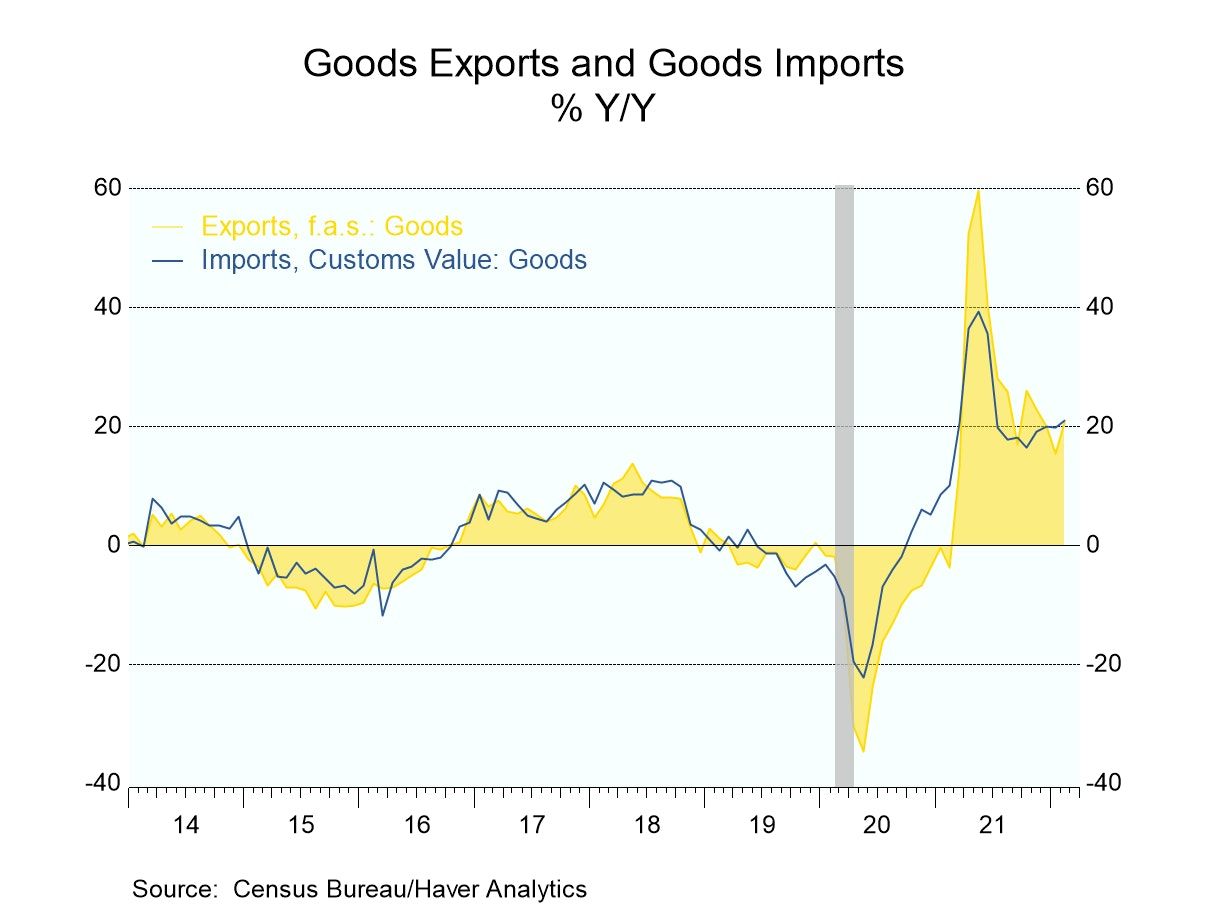U.S. Goods Trade Deficit Narrows in February
by:Tom Moeller
|in:Economy in Brief
Summary
- Exports rebound after sharp decline.
- Imports edge higher following strong increase.


The advance estimate of the U.S. international trade deficit in goods eased to $106.59 billion in February from the record $107.57 billion in January. A $106.8 billion deficit had been expected in the Action Economics Forecast Survey. Exports of goods increased 1.2% (20.7% y/y) following a 1.5% decline. Imports gained 0.3% (21.1% y/y) after increasing 1.8% in January.
The February increase in exports reflected a 6.3% (33.8% y/y) rebound in non-auto consumer goods which followed a 13.6% January decline. Exports of foods, feeds & beverages rose 3.6% last month (5.9% y/y) after holding steady in January. Industrial supplies & materials exports rose 2.6% last month (30.5% y/y) after edging 0.8% higher. Working 3.4% lower (1.6% y/y) were exports of autos & parts following a 5.1% decline. Capital goods exports were off 1.7% in February (+16.5% y/y) after they rose 2.4% in January.
Imports increased as industrial supplies & materials surged 4.4% in February (39.3% y/y) after rising 2.6% in January. Capital goods imports rose 1.5% (16.6% y/y), about as they did in January. Nonauto consumer goods imports improved 0.6% (20.0% y/y) following a 0.9% gain. These increases were offset last month by a 9.9% decline (+4.0% y/y) in imports of autos & parts which came after a 5.1% increase. Also falling by 3.0% (+26.1% y/y) were imports of foods, feeds & beverages which followed January's 8.6% rise.
The advance international trade data can be found in Haver's USECON database. The expectation figure is from the Action Economics Forecast Survey, which is in AS1REPNA.


Tom Moeller
AuthorMore in Author Profile »Prior to joining Haver Analytics in 2000, Mr. Moeller worked as the Economist at Chancellor Capital Management from 1985 to 1999. There, he developed comprehensive economic forecasts and interpreted economic data for equity and fixed income portfolio managers. Also at Chancellor, Mr. Moeller worked as an equity analyst and was responsible for researching and rating companies in the economically sensitive automobile and housing industries for investment in Chancellor’s equity portfolio. Prior to joining Chancellor, Mr. Moeller was an Economist at Citibank from 1979 to 1984. He also analyzed pricing behavior in the metals industry for the Council on Wage and Price Stability in Washington, D.C. In 1999, Mr. Moeller received the award for most accurate forecast from the Forecasters' Club of New York. From 1990 to 1992 he was President of the New York Association for Business Economists. Mr. Moeller earned an M.B.A. in Finance from Fordham University, where he graduated in 1987. He holds a Bachelor of Arts in Economics from George Washington University.
More Economy in Brief
 Global| Feb 05 2026
Global| Feb 05 2026Charts of the Week: Balanced Policy, Resilient Data and AI Narratives
by:Andrew Cates






